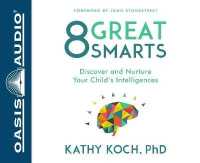- ホーム
- > 洋書
- > 英文書
- > Computer / General
Full Description
Comprehensive overview of the fledgling domain of federated learning (FL), explaining emerging FL methods, architectural approaches, enabling frameworks, and applications
Model Optimization Methods for Efficient and Edge AI explores AI model engineering, evaluation, refinement, optimization, and deployment across multiple cloud environments (public, private, edge, and hybrid). It presents key applications of the AI paradigm, including computer vision (CV) and Natural Language Processing (NLP), explaining the nitty-gritty of federated learning (FL) and how the FL method is helping to fulfill AI model optimization needs. The book also describes tools that vendors have created, including FL frameworks and platforms such as PySyft, Tensor Flow Federated (TFF), FATE (Federated AI Technology Enabler), Tensor/IO, and more.
The first part of the text covers popular AI and ML methods, platforms, and applications, describing leading AI frameworks and libraries in order to clearly articulate how these tools can help with visualizing and implementing highly flexible AI models quickly. The second part focuses on federated learning, discussing its basic concepts, applications, platforms, and its potential in edge systems (such as IoT).
Other topics covered include:
Building AI models that are destined to solve several problems, with a focus on widely articulated classification, regression, association, clustering, and other prediction problems
Generating actionable insights through a variety of AI algorithms, platforms, parallel processing, and other enablers
Compressing AI models so that computational, memory, storage, and network requirements can be substantially reduced
Addressing crucial issues such as data confidentiality, data access rights, data protection, and access to heterogeneous data
Overcoming cyberattacks on mission-critical software systems by leveraging federated learning
Written in an accessible manner and containing a helpful mix of both theoretical concepts and practical applications, Model Optimization Methods for Efficient and Edge AI is an essential reference on the subject for graduate and postgraduate students, researchers, IT professionals, and business leaders.
Contents
About the Editors xxi
List of Contributors xxiii
1 Fundamentals of Edge AI and Federated Learning 1
Atefeh Hemmati, Hanieh Mohammadi Arzanagh, and Amir Masoud Rahmani
2 AI Applications - Computer Vision and Natural Language Processing 25
Balakrishnan Chinnaiyan, Sundaravadivazhagan Balasubaramanian, Mahalakshmi Jeyabalu, and Gayathry S. Warrier
3 An Overview of AI Platforms, Frameworks, Libraries, and Processors 43
Pavan Kumar Akkisetty
4 Model Optimization Techniques for Edge Devices 57
Yamini Nimmagadda
5 AI Model Optimization Techniques 87
G. Victor Daniel, M. Trupthi, G. Sridhar Reddy, A. Mallikarjuna Reddy, and K. Hemanth Sai
6 Federated Learning: Introduction, Evolution, Working, Advantages, and Its Application in Various Domains 109
Manoj Kumar Pandey, Naresh Kumar Kar, and Priyanka Gupta
7 Application Domains of Federated Learning 127
S. Annamalai, N. Sangeetha, M. Kumaresan, Dommaraju Tejavarma, Gandhodi Harsha Vardhan, and A. Suresh Kumar
8 Advanced Architectures and Innovative Platforms for Federated Learning: A Comprehensive Exploration 145
Neha Bhati and Narayan Vyas
9 Federated Learning: Bridging Data Privacy and AI Advancements 157
D. Sumathi, Likitha Chowdary Botta, Mure Sai Jaideep Reddy, and Avi Das
10 Securing Edge Learning: The Convergence of Block Chain and Edge Intelligence 169
Rakhi Mutha
11 Training on Edge 197
Yamini Nimmagadda
12 Architectural Patterns for the Design of Federated Learning Systems 223
Vijay Anand Rajasekaran, Jayalakshmi Periyasamy, Madala Guru Brahmam, and Balamurugan Baluswamy
13 Federated Learning for Intelligent IoT Systems: Background, Frameworks, and Optimization Techniques 241
Partha Pratim Ray
14 Enhancing Cybersecurity Through Federated Learning: A Critical Evaluation of Strategies and Implications 281
M. Ashok Kumar, Aliyu Mohammed, S. Sumanth, and V. Sivanantham
15 Blockchain for Securing Federated Learning Systems: Enhancing Privacy and Trust 299
Tarun Kumar Vashishth, Vikas Sharma, Bhupendra Kumar, Kewal Krishan Sharma, Sachin Chaudhary, and Rajneesh Panwar
16 Blockchain-Enabled Secure Federated Learning Systems for Advancing Privacy and Trust in Decentralized AI 321
Pawan Whig, Rattan Sharma, Nikhitha Yathiraju, Anupriya Jain, and Seema Sharma
17 An Edge Artificial Intelligence Federated Recommender System for Virtual Classrooms 341
M. Sirish Kumar, T. Rupa Rani, U. Rakesh, Dyavarashetty Sunitha, and G. Sunil Kumar
18 Federated Learning in Smart Cities 351
Seyedeh Yasaman Hosseini Mirmahaleh and Amir Masoud Rahmani
Index 391








